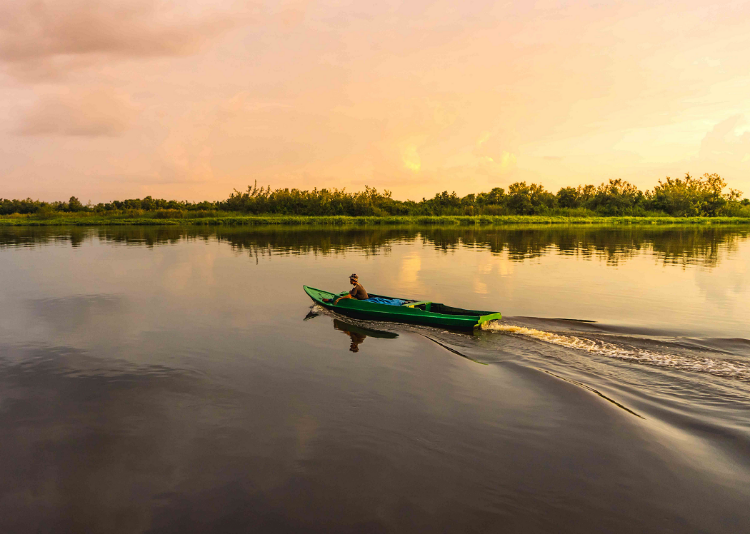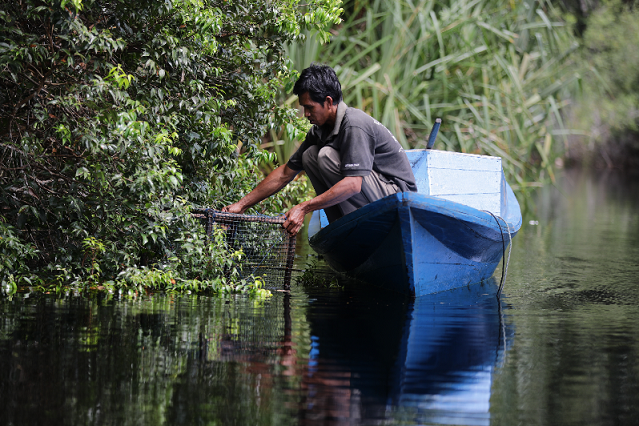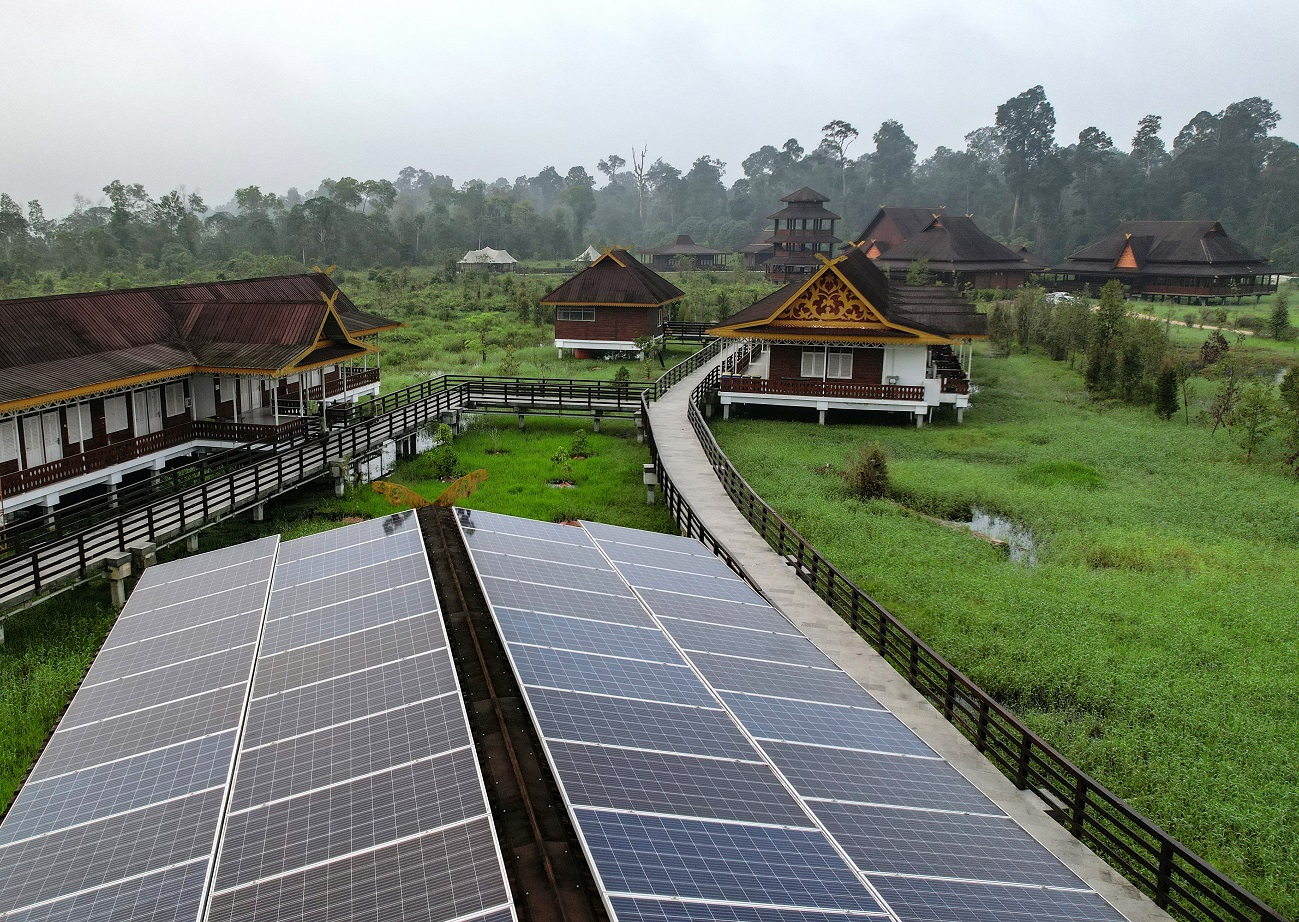December 27, 2023
In order to combat climate change, community involvement is key. That’s why Restorasi Ekosistem Riau (RER), in collaboration with its partners, has implemented a range of sustainable livelihood programs that focus on developing skills and improving community welfare. By working alongside local residents, we’re helping to establish and develop sustainable livelihoods that are beneficial to both people and nature.
The Kampar Peninsula is home to approximately 17,000 people, who live in nine villages dotted along the opposite side of the river from RER and separated from our concession areas by approximately 20km. Meanwhile, on nearby Padang Island, there are approximately 24,000 people living in 20 villages, most of which can be found along the east coast of the island.
These communities, representing a diverse range of ethnic groups, have been integral to the success of RER’s initiatives aimed at restoring and preserving ecosystems through the development of alternative, sustainable livelihoods.
Growing together: Developing more sustainable farming practices
On the Kampar Peninsula, livelihoods are inextricably linked the ebb and flow of nature. From agriculture and the cultivation of non-timber forest products (NTFPs) to plantations (sago, coconut, palm oil, and rubber) and freshwater fisheries, these activities depend on the availability of natural resources. RER also provides a number of NTFPs, such as freshwater fish and forest honey, that help meet family food requirements and supplement local incomes.

On nearby Padang Island, rubber, sago, and coconut plantations have long provided the economic bedrock of the local economy, supported by various forms of farming and fishing. To ensure these activities remain sustainable, RER has conducted training and awareness sessions that focus on no-burn farming techniques, promoting eco-friendly practices that reduce the risk of fires and contribute to the overall well-being of the environment.
On the Kampar Peninsula, RER has teamed up with BIDARA to help communities create new fruit and vegetable plots on previously unused areas of land. By implementing sustainable cropping techniques, households can now harvest daily staples like chili, eggplant, chickpeas, celery, bananas, and cassava up to three times a year. These efforts have already led to a big improvement in food security, while also promoting sustainable agricultural practices in the community.
Bright ideas: Solar energy powering sustainable fishing
The four rivers that pass through RER provide regular and seasonal catches for local fishermen. In the past, reliance on kerosene lamps was a fire risk, while the reliance on fossil fuels also contributed to climate change. In response, RER stepped in to install solar panels for 18 huts, so their owners had a safer, greener alternative. In addition, we renovated these buildings and provided the fishers with new nets, helping them work in an environmentally friendly manner, while also protecting them from the elements.
“Since the installation of solar panels, we have seen huge benefits, especially in our nighttime work to process our catch,” says Herman, who is a member of the Serkap Jaya Lestari fishermen’s group. “In the past, there were many incidents where our fish-smoking huts caught fire due to these oil lamps. Alhamdulillah, after RER helped us with solar panels, we have seen a major improvement.”
This approach has proved to be an effective way of protecting the local ecosystem, while also cutting down on fuel usage, minimizing the risk of fires, and improving the overall well-being of fishing communities. By living cleaner, greener lives, many local fishers have also been able to save money and raise their standards of living.
From nets to networks: Collaborations the key to sustainable fishing
Another example of this twin benefit approach – preserving nature while also enhancing livelihoods – can be seen in our collaboration with the University of Riau. Together, we’ve delivered training in freshwater aquaculture and fish product processing in local communities, empowering fisherfolk with the skills needed to implement more sustainable fishing methods. Now that these operations are up and running, the benefits can be seen in the abundance of fish in RER’s rivers, and the economic health of those who make their living from them.

In October 2021, RER hosted a pair of community fishery training sessions, bringing together 29 participants from six villages, including women members of the family welfare group Pemberdayaan Kesejahteraan Keluarga (PKK). Led by experts from the University of Riau, these participants worked on fish population management and processing techniques, learned how to reduce fish loss, improve shelf-life, and utilize by-products to create value-added products.
In 2023, we followed up this training in sustainable fishing techniques by providing nets to the Serkap Jaya Lestari group. In addition to providing the materials, RER also actively counsels and supports the community in healthy living. This year, RER we teamed up with local health centers and visited local elementary schools on Padang Island, where we introduced schoolkids to the topic of clean and healthy living.
RER’s holistic approach to conservation and communities
RER’s collaboration with local communities goes beyond environmental conservation. By adopting a big picture view and taking a holistic approach, we are helping build more resilient and self-sufficient communities that are better equipped to withstand future impacts of climate change, and able to contribute to conservation through sustainable livelihood practices.
As a facilitator in these communities, we also have a responsibility to lead by example. That’s why, in addition to our outreach activities, we’re constantly striving to improve our own practices and develop our knowledge.

In recent times, we’ve taken major steps forward on our sustainability journey, by making sure that all electricity for the Eco-Research Camp is generated by an off-grid photovoltaic hybrid-electric system, paired with two 45-kVA electric generators. Just like our work with local fishers, this initiative has helped to reduce the risk of fires and given us a cleaner, more sustainable alternative to fossil fuels.
From solar power to education, and from fishing to farming, RER is committed to finding science-based solutions that can improve lives and lessen the impacts of climate change through sustainable community development. In the Kampar Peninsula and on Padang Island, the rewards of these efforts can be seen in the productivity of rivers, fields, and forests, and in the wellbeing of local communities. As we continue moving forwards on our mission, people and partnerships will be central to success.